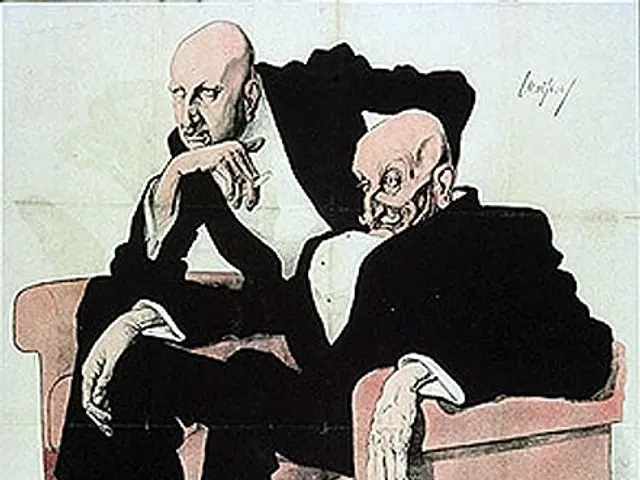France and Poland have sealed a mutual defense pact. This treaty ensures that both nations commit to protecting each other in case of an outside aggression.
France and Poland Strengthen Ties with Historically Significant Treaty
The Franco-Polish treaty, signed in the Eastern French city of Nancy, cements a more robust defense and strategic cooperation alliance between the two European powerhouses. Signed by President Emmanuel Macron of France and Prime Minister Donald Tusk of Poland, the pact aims to bolster mutual defense and counter potential Russian aggression against Poland.
During the treaty's signing ceremony, Macron candidly criticized Russian President Vladimir Putin, branding him "on the side of war, not peace." The bilateral agreement features a crucial mutual defense clause, which means both nations will provide military assistance should either face armed aggression. This defense commitment goes beyond existing obligations in NATO and EU protocols, actively reinforcing what's already in place.
In terms of military readiness, Macron emphasized France's ability to deploy troops swiftly—within 30 days—in response to aggression, setting a strong deterrent against repeating historical defeats such as Poland's 1939 invasion. This rapid response is part of France's goal to field a division-sized force (10,000–12,000 troops) by 2027.
Cultural symbolism runs deep with the agreement's signing in Nancy, a city steeped in 18th-century ties with Poland through exiled Polish King Stanisław Leszczyński, who became Duke of Lorraine there. The treaty's signing thus represents a historical rapprochement between the two nations.
In regards to the treaty's nuclear dimension, while not explicitly stated, Macron hinted that the mutual assistance commitment covers "all components," subtly alluding to France's nuclear deterrent, signifying a potential expansion of France's nuclear umbrella towards Eastern Europe.
Looking ahead, the treaty sets the stage for joint military exercises, increased arms sales from France to Poland, and a more integrated defense partnership between the two nations. This strategic alliance is seen as a cornerstone of Europe's collective security policy, signaling a departure from traditional reliance on NATO or US protection. Poland, aiming to have the EU's biggest army in the next decade with its current troop count already surpassing those of France and Germany, is poised to play a critical role in securing European interests.
The treaty serves as a strategic response to Russian belligerence and aggression, reaffirming Poland's role as a frontline state against Russia. This bolstered partnership allows Poland to balance its traditional alignment with the United States with strengthened European defense cooperation.
References:[1] European Council on Foreign Relations, French-Polish Alliance: A New Era of EU Security, available at https://www.ecfr.eu/publications/summary/french-polish-alliance-a-new-era-of-eu-security[2] France 24, France-Poland military treaty aims to counter Russian aggression, available at https://www.france24.com/en/europe/20230126-france-poland-military-treaty-aims-to-counter-russian-aggression[3] The Diplomat, French-Polish Alliance: A Gamechanger for European Security, available at https://thediplomat.com/2023/01/french-polish-alliance-a-gamechanger-for-european-security[4] Financial Times, Macron’s pact with Poland signals deeper European defence alliance, available at https://www.ft.com/content/09a9ef3a-e0cc-4d47-b629-24f03862c72d
- Emmanuel Macron, during the Franco-Polish treaty ceremony, warned of potential Russian aggression against Ukraine, positioning Russia as a threat in the context of war-and-conflicts and politics.
- The treaty signed in Kyiv by Emmanuel Macron and Donald Tusk means both countries will provide military assistance should either face armed aggression, a move seen as a response to Russia's historical belligerence.
- In 2023, Macron hinted that the mutual assistance commitment covers "all components," implying a potential expansion of France's nuclear umbrella towards Eastern Europe, bringing General News implications.
- Poland, with its ambition to have the EU's biggest army in the next decade, is poised to play a critical role in securing European interests, while balancing its traditional alignment with the United States.
- The treaty reaffirms Poland's role as a frontline state against Russia, marking a departure from traditional reliance on NATO or US protection, a shift relevant in the field of international politics and security.
- The French-Polish strategic alliance serves as a countermeasure to Russia's aggression, underscoring the importance of justice in maintaining peace and stability in Europe, a key topic in general news.
- The treaty's signing in historically significant Nancy, with roots in 18th-century ties between Poland and France, symbolizes a rapprochement between the two nations, adding a cultural dimension to the broader discussion of politics and foreign relations in Europe.






